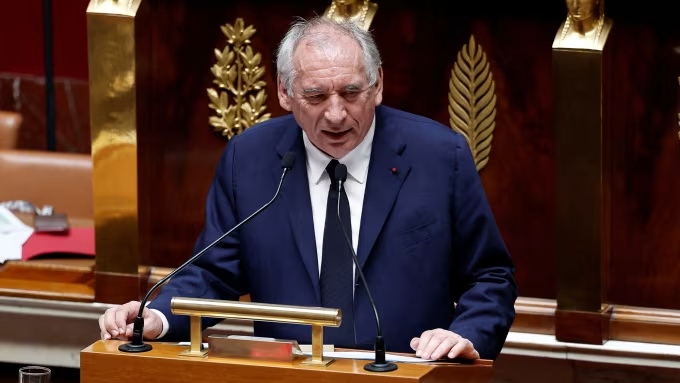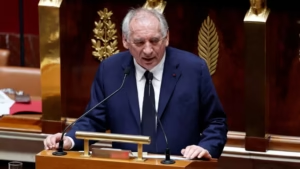
French Government Collapses After Prime Minister François Bayrou Loses Confidence Vote
- Foreign News
- 08.09.2025
- No Comment
- 46
French Government Collapses After Prime Minister François Bayrou Loses Confidence Vote

was ousted following a dramatic confidence vote in parliament. Lawmakers rejected his government’s
controversial €44 billion ($51 billion) austerity plan, sparking instability at a critical time for both the
French economy and its role on the global stage. This latest upheaval underscores France’s fragile political
balance under President Emmanuel Macron and raises pressing questions about the future direction
of the country’s governance.
364 MPs voted against him while 194 voted in his favor, surpassing the
280 votes required to topple the government. The vote was triggered by Bayrou himself in a bid
to push through his budget savings package, which included freezing public spending and even
scrapping two national holidays.Instead of consolidating support, the move backfired spectacularly. Lawmakers across both the left and right
condemned the austerity measures, branding them unfair and economically dangerous. Bayrou’s defeat marks the
second consecutive collapse of a French government in less than a year, following Michel Barnier’s
downfall in December.
on Tuesday morning. Macron now faces the unenviable task of selecting a new prime minister, with names such as
Armed Forces Minister Sébastien Lecornu and Justice Minister Gérald Darmanin
being floated as potential frontrunners.

However, Macron’s choices are severely limited. Both the far-left and far-right have made it clear they would
immediately call another vote of no confidence against any centrist appointee. While theoretically,
Macron could nominate someone from outside his centrist bloc, such a move would almost certainly ignite
further political gridlock, as opposition parties remain deeply polarized.
those of Spain, Portugal, and Greece countries that were once at the heart of the Eurozone debt crisis.
Analysts warn that if France faces a sovereign debt rating downgrade later this week, it could have severe
implications for the country’s financial credibility within Europe.Bayrou, before the vote, warned lawmakers that rejecting his austerity plan would not make France’s fiscal
problems disappear. “You have the power to bring down the government, but you do not have the power to erase reality,”
he said. His words reflect the harsh truth: France’s debt burden continues to balloon, and
political instability only worsens the situation.
snap parliamentary election. Angered by the far-right National Rally’s
strong showing in the 2024 European Parliament elections, Macron gambled on securing fresh support for his
centrist bloc. Instead, the move backfired, leaving parliament fractured and highly unstable.With both the far-right and far-left emboldened, Macron has since struggled to govern effectively. The repeated
collapse of centrist-led governments highlights the deep divisions within French politics and the growing
disillusionment among citizens with the political elite.

mockingly hosted a “Bayrou’s farewell party” protest ahead of the vote, symbolizing the
public’s frustration with yet another short-lived government.France’s powerful trade unions and far-left groups are calling for nationwide demonstrations
under the slogan “Bloquons tout” (“Let’s block everything”). Protests are already scheduled for this
Wednesday, with further mobilization planned for September 18. Analysts warn that anger against the political
class is likely to intensify, creating a volatile environment that could escalate into wider unrest.
far-right National Rally has demanded the president dissolve parliament and call fresh elections.
However, such a move would likely strengthen the far right’s hand even further, potentially leaving Macron’s
centrist bloc marginalized.With three failed centrist prime ministers in less than two years, the opposition’s message is clear:
they will not tolerate another centrist leader. Macron could attempt to appoint a figure from the
left or right, but doing so would ignite fresh resistance from the opposing camp. In short, Macron’s political
room to maneuver is shrinking fast.
Middle East, the European Union relies heavily on France’s leadership. The collapse of yet
another French government weakens Europe’s position internationally, while figures such as Russian President
Vladimir Putin and former U.S. President Donald Trump are already exploiting
the turmoil to highlight Europe’s political weakness.
inherit a deeply divided parliament, a restless public, and a ballooning fiscal crisis. Whoever steps into
Matignon the official residence of the French prime minister will face immense challenges,
with little chance of satisfying all sides of the political spectrum.According to a recent Elabe poll, if fresh elections were held today, the National Rally would
emerge as the largest party, followed by the left-wing coalition, leaving Macron’s centrist bloc in a weak
third place. While many believe the far right will eventually seize power whether now or after the 2027
presidential election there is little confidence that such a shift would resolve France’s deep-rooted
problems.







